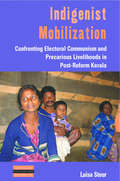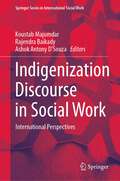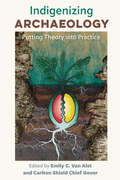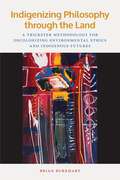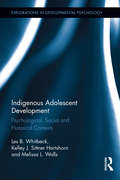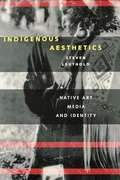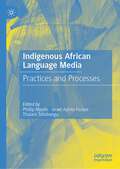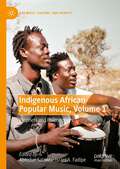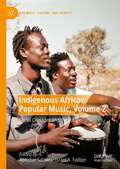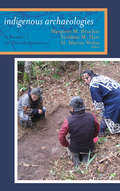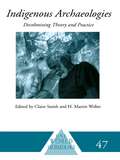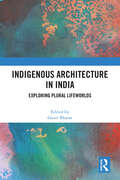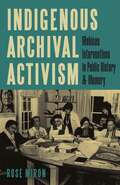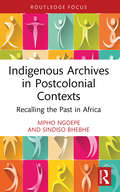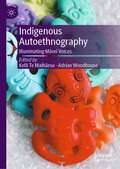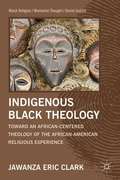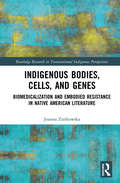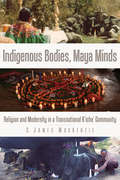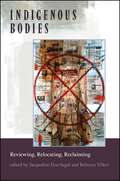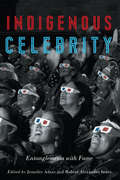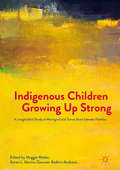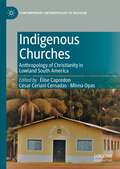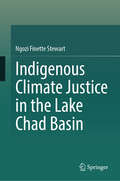- Table View
- List View
Indigenist Mobilization: Confronting Electoral Communism and Precarious Livelihoods in Post-Reform Kerala
by Luisa SteurIn Kerala, political activists with a background in Communism are now instead asserting political demands on the basis of indigenous identity. Why did a notion of indigenous belonging come to replace the discourse of class in subaltern struggles? Indigenist Mobilization answers this question through a detailed ethnographic study of the dynamics between the Communist party and indigenist activists, and the subtle ways in which global capitalist restructuring leads to a resonance of indigenist visions in the changing everyday working lives of subaltern groups in Kerala.
Indigenization Discourse in Social Work: International Perspectives (Springer Series in International Social Work)
by Rajendra Baikady Koustab Majumdar Ashok Antony D’SouzaThis contributed volume provides an in-depth understanding of contemporary debates, discussions and insights on Indigenous social work theory, education and practice across the globe. Based on theoretical and empirical perspectives, authors collectively contribute to a comprehensive, critical and up-to-date discussion about Indigenous social work theories, decolonization of social work education, Indigenous social work curriculum, Indigenous social work practice, and cultural perspectives towards enhancing Indigenous social work education and practice. The key features of this book are: Critical insights into the historical evolution of Indigenous social work;Global debates on the westernization and indigenization of social work education;An overview of Indigenous social work and its practice in diverse cultural contexts;Critical perspective of Indigenous social work education; and Coverage of a diverse range of geographical areas. Indigenization Discourse in Social Work: International Perspectives is an indispensable resource for students, scholars, independent researchers, academicians, policymakers and practitioners who are working in the field of social work, especially those who are interested in Indigenous social work issues. Moreover, it is an invaluable text for students, scholars and academicians who are interested in international social work with a special focus on Indigenous social work. In addition, students and scholars in sociology, development studies, public policy and economics working with Indigenous people and who are interested in Indigenous studies will find this book useful as an interdisciplinary reference.
Indigenizing Archaeology: Putting Theory into Practice
by Emily C. Van Alst Carlton Shield Chief GoverCase studies and perspectives from Indigenous scholars who are helping to transform the discipline of archaeology This book highlights early-career Indigenous scholars conducting research in North America who are advancing the growing paradigm of archaeological study done with, by, and for members of Native-descendant communities. Expanding on the foundational works of scholars from previous generations, this volume includes examples of Indigenous methodologies and illustrates different approaches for applying theory in various research scenarios.The contributors weave together western scientific research methods and Indigenous knowledge, ontologies, and epistemologies, demonstrating how this combination can lead to fuller interpretations of the archaeological record. Case studies describe new, culturally specific ways of establishing working relationships with descendant communities and stakeholders. The volume argues that there are many ways a collaborative method can be implemented and that Indigenous people should be involved not just as consultants but as participants and stewards of their own cultural heritage. Indigenizing Archaeology demonstrates that this approach is more than a subfield; it is the path forward for the discipline.Contributors: Emily C. Van Alst | Carlton Shield Chief Gover | Ash Boydston-Schmidt | Honey Constant-Inglis | Patrick Cruz | Lydia Curliss | Zoë Antoinette Eddy | Nicholas C. Laluk | Kay Kakendasot Mattena | S. Margaret Spivey-Faulkner | Ashleigh BigWolf Thompson | Joe Watkins
Indigenizing Philosophy Through The Land: A Trickster Methodology For Decolonizing Environmental Ethics And Indigenous Futures (American Indian Studies)
by Brian BurkhartLand is key to the operations of coloniality, but the power of the land is also the key anticolonial force that grounds Indigenous liberation. This work is an attempt to articulate the nature of land as a material, conceptual, and ontological foundation for Indigenous ways of knowing, being, and valuing. As a foundation of valuing, land forms the framework for a conceptualization of Indigenous environmental ethics as an anticolonial force for sovereign Indigenous futures. This text is an important contribution in the efforts to Indigenize Western philosophy, particularly in the context of settler colonialism in the United States. It breaks significant ground in articulating Indigenous ways of knowing and valuing to Western philosophy—not as artifact that Western philosophy can incorporate into its canon, but rather as a force of anticolonial Indigenous liberation. Ultimately, Indigenizing Philosophy through the Land shines light on a possible road for epistemically, ontologically, and morally sovereign Indigenous futures.
Indigenous (In)Justice: Human Rights Law and Bedouin Arabs in the Naqab/Negev
by Ahmad Amara Ismael Abu-Saad Oren YiftachelThe indigenous Bedouin Arab population in the Naqab/Negev desert in Israel has experienced a history of displacement, intense political conflict, and cultural disruption, along with recent rapid modernization, forced urbanization, and migration. This volume of essays highlights international, national, and comparative law perspectives and explores the legal and human rights dimensions of land, planning, and housing issues, as well as the economic, social, and cultural rights of indigenous peoples. Within this context, the essays examine the various dimensions of the âeoenegotiationsâe#157; between the Bedouin Arab population and the State of Israel. Indigenous (In)Justice locates the discussion of the Naqab/Negev question within the broader Israeli-Palestinian conflict and within key international debates among legal scholars and human rights advocates, including the application of the Declaration on the Rights of Indigenous Peoples, the formalization of traditional property rights, and the utility of restorative and reparative justice approaches. Leading international scholars and professionals, including the current United Nations Special Rapporteur on Violence against Women and the former United Nations Special Rapporteur on the Rights of Indigenous Peoples, are among the contributors to this volume.
Indigenous Adolescent Development: Psychological, Social and Historical Contexts (Explorations in Developmental Psychology)
by Les B. Whitbeck Melissa Walls Kelley HartshornThis volume explores the first four waves of a longitudinal diagnostic study of Indigenous adolescents and their families. The first study of its kind, it calls attention to culturally specific risk factors that affect Indigenous (American Indian and Canadian First Nations) adolescent development and describe the historical and social contexts in which Indigenous adolescents come of age. It provides unique information on ethical research and development within Indigenous communities, psychiatric diagnosis at early and mid-adolescence, and suggestions for putting the findings into action through empirically-based interventions.
Indigenous Aesthetics: Native Art, Media, and Identity
by Steven LeutholdWhat happens when a Native or indigenous person turns a video camera on his or her own culture? Are the resulting images different from what a Westernized filmmaker would create, and, if so, in what ways? How does the use of a non-Native art-making medium, specifically video or film, affect the aesthetics of the Native culture?<P><P>These are some of the questions that underlie this rich study of Native American aesthetics, art, media, and identity. Steven Leuthold opens with a theoretically informed discussion of the core concepts of aesthetics and indigenous culture and then turns to detailed examination of the work of American Indian documentary filmmakers, including George Burdeau and Victor Masayesva, Jr. He shows how Native filmmaking incorporates traditional concepts such as the connection to place, to the sacred, and to the cycles of nature. While these concepts now find expression through Westernized media, they also maintain continuity with earlier aesthetic productions. In this way, Native filmmaking serves to create and preserve a sense of identity for indigenous people.
Indigenous African Knowledge Production
by Njoki Nathani-WaneThe Jie people of northern Uganda and the Turkana of northern Kenya have a genesis myth about Nayeche, a Jie woman who followed the footprints of a gray bull across the waterless plateau and who founded a "cradle land" in the plains of Turkana. In Remembering Nayeche and the Gray Bull Engiro, Mustafa Kemal Mirzeler shows how the poetic journey of Nayeche and the gray bull Engiro and their metaphorical return during the Jie harvest rituals gives rise to stories, imagery, and the articulation of ethnic and individual identities.Since the 1990s, Mirzeler has travelled to East Africa to apprentice with storytellers. Remembering Nayeche and the Gray Bull Engiro is both an account of his experience listening to these storytellers and of how oral tradition continues to evolve in the modern world. Mirzeler's work contributes significantly to the anthropology of storytelling, the study of myth and memory, and the use of oral tradition in historical studies.
Indigenous African Language Media: Practices and Processes
by Phillip Mpofu Thulani Tshabangu Israel Ayinla FadipeThe book contributes to the sparse academic literature on African and minority language media research. It serves as a compendium of experiences, activities and case studies on the use of native language media. Chapters in this book make theoretical, methodical and empirical contributions about indigenous African language media that are affected by structural factors of politics, technology, culture and economy and how they are creatively produced and appropriated by their audiences across African cultures and contexts. This book explores indigenous African language media about media representations, media texts and contents, practice-based activities, audience reception and participation, television, popular culture and cinema, peace and conflict resolution, health and environmental crisis communication, citizen journalism, ethnic and identity formation, beat analysis and investigative journalism, and corporate communication. There are hardly any similar works that focus on the various issues relating to this body of knowledge. The book provides a valuable companion for scholars in various fields like communication, media studies, African studies, African languages, popular culture, journalism, health and environmental communication.
Indigenous African Popular Music, Volume 1: Prophets and Philosophers (Pop Music, Culture and Identity)
by Abiodun Salawu Israel A. FadipeThis volume explores the nature, philosophies and genres of indigenous African popular music, focusing on how indigenous African popular music artistes are seen as prophets and philosophers, and how indigenous African popular music depicts the world. Indigenous African popular music has long been under-appreciated in communication scholarship. However, understanding the nature and philosophies of indigenous African popular music reveals an untapped diversity which only be unraveled by knowledge of the myriad cultural backgrounds from which its genres originate. Indigenous African popular musicians have become repositories of indigenous cultural traditions and cosmologies.With a particular focus on scholarship from Nigeria, Zimbabwe and South Africa, this volume explores the work of these pioneering artists and their protégés who are resiliently sustaining, recreating and popularising indigenous popular music in their respective African communities, and at the same time propagating the communal views about African philosophies and the temporal and spiritual worlds in which they exist.
Indigenous African Popular Music, Volume 2: Social Crusades and the Future (Pop Music, Culture and Identity)
by Abiodun Salawu Israel A. FadipeThis volume examines how African indigenous popular music is deployed in democracy, politics and for social crusades by African artists. Exploring the role of indigenous African popular music in environmental health communication and gender empowerment, it subsequently focuses on how the music portrays the African future, its use by African youths, and how it is affected by advanced broadcast technologies and the digital media. Indigenous African popular music has long been under-appreciated in communication scholarship. However, understanding the nature and philosophies of indigenous African popular music reveals an untapped diversity which can only be unraveled by the knowledge of myriad cultural backgrounds from which its genres originate. With a particular focus on scholarship from Nigeria, Zimbabwe and South Africa, this volume explores how, during the colonial period and post-independence dispensation, indigenous African music genres and their artists were mainstreamed in order to tackle emerging issues, to sensitise Africans about the affairs of their respective nations and to warn African leaders who have failed and are failing African citizenry about the plight of the people. At the same time, indigenous African popular music genres have served as a beacon to the teeming African youths to express their dreams, frustrations about their environments and to represent themselves. This volume explores how, through the advent of new media technologies, indigenous African popular musicians have been working relentlessly for indigenous production, becoming champions of good governance, marginalised population, and repositories of indigenous cultural traditions and cosmologies.
Indigenous Archaeologies: A Reader on Decolonization (One World Archaeology Ser. #Vol. 47)
by Margaret M. Bruchac Siobhan M. Hart H. Martin WobstThis comprehensive reader on indigenous archaeology shows that collaboration has become a key part of archaeology and heritage practice worldwide. Collaborative projects and projects directed and conducted by indigenous peoples independently have become standard, community concerns are routinely addressed, and oral histories are commonly incorporated into research. This volume begins with a substantial section on theoretical and philosophical underpinnings, then presents key articles from around the globe in sections on Oceania, North America, Mesoamerica and South America, Africa, Asia, and Europe. Editorial introductions to each piece contextualize them in the intersection of archaeology and indigenous studies. This major collection is an ideal text for courses in indigenous studies, archaeology, heritage management, and related fields.
Indigenous Archaeologies: Decolonising Theory and Practice (One World Archaeology #Vol. 47)
by H. Martin Wobst Claire SmithWith case studies from North America to Australia and South Africa and covering topics from archaeological ethics to the repatriation of human remains, this book charts the development of a new form of archaeology that is informed by indigenous values and agendas. This involves fundamental changes in archaeological theory and practice as well as substantive changes in the power relations between archaeologists and indigenous peoples. Questions concerning the development of ethical archaeological practices are at the heart of this process.
Indigenous Architecture in India: Exploring Plural Lifeworlds
by Gauri BharatThis volume focuses on socio- spatial practices of indigenous communities in India. It explores the interrelation between the built environments and lifeworlds, i.e. practices, patterns, and structures of everyday life. The chapters deal with different ideas and definitions of indigeneity, while also addressing the complex equations between the production and perception of built forms, indigenous technologies, on the one hand, and social, environmental and political contexts, questions of aesthetics, identity, and self-representation on the other.From Adivasi art and sacred sites to craft villages and nomadic pastoralists in western India, from indigenous bangle makers in urban north India to terracotta crafts people on the south, each chapter focuses on different communities and the contours of their contemporary lifeworlds. The contributions actively attempt to foreground the logic and perspectives of the communities themselves as the epistemological centre of the architectural and material discourses on indigeneity.This book will be useful for students, teachers, and researchers of architecture, urban design, urban studies, urban development and planning, anthropology, sociology, and museum studies. It will also be of interest to urban planners and designers, policy planners, local government authorities, and professionals engaged in the discipline.
Indigenous Archival Activism: Mohican Interventions in Public History and Memory
by Rose MironWho has the right to represent Native history? The past several decades have seen a massive shift in debates over who owns and has the right to tell Native American history and stories. For centuries, non-Native actors have collected, stolen, sequestered, and gained value from Native stories and documents, human remains, and sacred objects. However, thanks to the work of Native activists, Native history is now increasingly being repatriated back to the control of tribes and communities. Indigenous Archival Activism takes readers into the heart of these debates by tracing one tribe&’s fifty-year fight to recover and rewrite their history. Rose Miron tells the story of the Stockbridge-Munsee Mohican Nation and their Historical Committee, a group of mostly Mohican women who have been collecting and reorganizing historical materials since 1968. She shows how their work is exemplary of how tribal archives can be used strategically to shift how Native history is accessed, represented, written and, most importantly, controlled. Based on a more than decade-long reciprocal relationship with the Stockbridge-Munsee Mohican Nation, Miron&’s research and writing is shaped primarily by materials found in the tribal archive and ongoing conversations and input from the Stockbridge-Munsee Historical Committee. As a non-Mohican, Miron is careful to consider her own positionality and reflects on what it means for non-Native researchers and institutions to build reciprocal relationships with Indigenous nations in the context of academia and public history, offering a model both for tribes undertaking their own reclamation projects and for scholars looking to work with tribes in ethical ways.
Indigenous Archives in Postcolonial Contexts: Recalling the Past in Africa
by Mpho Ngoepe Sindiso BhebheIndigenous Archives in Postcolonial Contexts revisits the definition of a record and extends it to include memory, murals, rock art paintings and other objects. Drawing on five years of research and examples from Zimbabwe, Botswana and South Africa, the authors analyse archives in the African context. Considering issues such as authentication, ownership and copyright, the book considers how murals and their like can be used as extended or counter archives. Arguing that extended archives can reach people in a way that traditional archives cannot and that such archives can be used to bridge the gaps identified within archival repositories, the authors also examine how such archives are managed and authenticated using traditional archival principles. Presenting case studies from organisations such as Gay and Lesbian Memory in Action Archives (GALA) and heritage projects such as the Makgabeng Open Cultural Museum, the authors also analyse Indigenous family praises and songs and explore how such records are preserved and transmitted to the next generation. Indigenous Archives in Postcolonial Contexts demonstrates how the voices of the marginalised can be incorporated into archives. Making an important contribution to the effort to decolonise African archives, the book will be essential reading for academics and students working in archival studies, library and information science, Indigenous studies, African studies, cultural heritage, history and anthropology.
Indigenous Autoethnography: Illuminating Māori Voices
by Kelli Te Maihāroa Adrian WoodhouseThis book opens new pathways for decolonial autoethnography, presented as a series of reflective stories that showcase how Māori have negotiated and navigated their personal and professional identities within contemporary society. Framed within the academic methodology of Indigenous Autoethnography, authors recount their personal and professional experiences to address their encounters with cultural trauma and personal enlightenment. As a culturally responsive methodology, Indigenous Autoethnography embraces reflective practice and critical awakening to validate Indigenous knowledge, ensuring that it remains meaningful and responsive to the needs of Māori. Utilising metaphorical storytelling as a primary means of sensemaking, this work reinforces the importance of Māori and other Indigenous People to seek wisdom from the past to guide them into the future. With Indigenous knowledge historically ignored and misrepresented in higher education, this seminal text provides invaluable guidance for global Indigenous researchers seeking to produce story work that genuinely encompasses physical, emotional, and spiritual dimensions.
Indigenous Black Theology
by Jawanza Eric ClarkThis work is concerned with the way Black Christian formation, because of the acceptance of universal, absolute, and exclusive Christian doctrines, seems to justify and even encourage anti-African sentiment.
Indigenous Bodies, Cells, and Genes: Biomedicalization and Embodied Resistance in Native American Literature (Routledge Research in Transnational Indigenous Perspectives)
by Joanna ZiarkowskaThis book explores Native American literary responses to biomedical discourses and biomedicalization processes as they circulate in social and cultural contexts. Native American communities resist reductivism of biomedicine that excludes Indigenous (and non-Western) epistemologies and instead draw attention to how illness, healing, treatment, and genetic research are socially constructed and dependent on inherently racialist thinking. This volume highlights how interventions into the hegemony of biomedicine are vigorously addressed in Native American literature. The book covers tuberculosis and diabetes epidemics, the emergence of Native American DNA, discoveries in biotechnology, and the problematics of a biomedical model of psychiatry. The book analyzes work by Louise Erdrich, Sherman Alexie, LeAnne Howe, Linda Hogan, Heid E. Erdrich, Elissa Washuta and Frances Washburn. The book will appeal to scholars of Native American and Indigenous Studies, as well as to others with an interest in literature and medicine.
Indigenous Bodies, Maya Minds: Religion and Modernity in a Transnational K'iche' Community (IMS Culture and Society)
by C. James MacKenzieIndigenous Bodies, Maya Minds examines tension and conflict over ethnic and religious identity in the K’iche’ Maya community of San Andrés Xecul in the Guatemalan Highlands and considers how religious and ethnic attachments are sustained and transformed through the transnational experiences of locals who have migrated to the United States. Author C. James MacKenzie explores the relationship among four coexisting religious communities within Highland Maya villages in contemporary Guatemala—costumbre, traditionalist religion with a shamanic substrate; “Enthusiastic Christianity,” versions of Charismaticism and Pentecostalism; an “inculturated” and Mayanized version of Catholicism; and a purified and antisyncretic Maya Spirituality—with attention to the modern and nonmodern worldviews that sustain them. He introduces a sophisticated set of theories to interpret both traditional religion and its relationship to other contemporary religious options, analyzing the relation among these various worldviews in terms of the indigenization of modernity and the various ways modernity can be apprehended as an intellectual project or an embodied experience. Indigenous Bodies, Maya Minds investigates the way an increasingly plural religious landscape intersects with ethnic and other identities. It will be of interest to Mesoamerican and Mayan ethnographers, as well as students and scholars of cultural anthropology, indigenous cultures, globalization, and religion.
Indigenous Bodies: Reviewing, Relocating, Reclaiming
by Jacqueline Fear-Segal Rebecca TillettThis interdisciplinary collection of essays, by both Natives and non-Natives, explores presentations and representations of indigenous bodies in historical and contemporary contexts. Recent decades have seen a wealth of scholarship on the body in a wide range of disciplines. Indigenous Bodies extends this scholarship in exciting new ways, bringing together the disciplinary expertise of Native studies scholars from around the world. The book is particularly concerned with the Native body as a site of persistent fascination, colonial oppression, and indigenous agency, along with the endurance of these legacies within Native communities. At the core of this collection lies a dual commitment to exposing numerous and diverse disempowerments of indigenous peoples, and to recognizing the many ways in which these same people retained and/or reclaimed agency. Issues of reviewing, relocating, and reclaiming bodies are examined in the chapters, which are paired to bring to light juxtapositions and connections and further the transnational development of indigenous studies.
Indigenous Celebrity: Entanglements with Fame
by Jennifer Adese and Robert Alexander Innes;editorsIndigenous Celebrity speaks to the possibilities, challenges, and consequences of popular forms of recognition, critically recasting the lens through which we understand Indigenous people’s entanglements with celebrity. It presents a wide range of essays that explore the theoretical, material, social, cultural, and political impacts of celebrity on and for Indigenous people. It questions and critiques the whitestream concept of celebrity and the very juxtaposition of “Indigenous” and “celebrity” and casts a critical lens on celebrity culture’s impact on Indigenous people. Indigenous people who willingly engage with celebrity culture, or are drawn up into it, enter into a complex terrain of social relations informed by layered dimensions of colonialism, racism, sexism, homophobia/transphobia, and classism. Yet this reductive framing of celebrity does not account for the ways that Indigenous people’s own worldviews inform Indigenous engagement with celebrity culture––or rather, popular social and cultural forms of recognition. Indigenous Celebrity reorients conversations on Indigenous celebrity towards understanding how Indigenous people draw from nation-specific processes of respect and recognition while at the same time navigating external assumptions and expectations. This collection examines the relationship of Indigenous people to the concept of celebrity in past, present, and ongoing contexts, identifying commonalities, tensions, and possibilities.
Indigenous Children Growing Up Strong
by Maggie Walter Karen L. Martin Gawaian Bodkin-AndrewsThis edited collection by leading Australian Aboriginal scholars uses data from the Longitudinal Study of Indigenous Children (LSIC) to explore how Aboriginal and Torres Strait Islander children are growing up in contemporary Australia. The authors provide an overview of the study, including the Indigenous methodological and ethical framework which guides the analysis. They also address the resulting policy ramifications, alongside the cultural, social, educational and family dynamics of Indigenous children's lives. Indigenous Children Growing Up Strong will be of interest to students and scholars in the areas of sociology, social work, anthropology and childhood and youth studies.
Indigenous Churches: Anthropology of Christianity in Lowland South America (Contemporary Anthropology of Religion)
by Minna Opas Élise Capredon César Ceriani CernadasThis book raises the question of what an Indigenous church is and how its members define their ties of affiliation or separation. Establishing a pioneering dialogue between Amazonian and Gran Chaco studies on Indigenous Christianity, the contributions address historical processes, cosmological conceptions, ritual practices, leadership dynamics, and material formations involved in the creation and diversification of Indigenous churches. Instead of focusing on the study of missionary ideologies and praxis, the book explores Indigenous peoples' interpretations of Christianity and the institutional arrangements they make to create, expand, or dismantle their churches. In doing so, the volume offers a South American contribution to the theoretical project of the anthropology of Christianity, especially as it relates to the issue of denominationalism and inter-denominational relations.
Indigenous Climate Justice in the Lake Chad Basin
by Ngozi Finette StewartThis volume aims to highlight Indigenous knowledge toward climate mitigation with a focus on peoples in Sub-Saharan Africa, an underpublished region vis a vis this topic. The term &“climate justice&” has emerged to explain how vulnerable, marginalized, and disadvantaged groups - often those who are least responsible for climate change caused by (often colonially induced) environmental damage, tend to suffer its gravest impacts. Indigenous climate justice efforts show promise in contributing to managing global climate change and its impact on vulnerable groups, especially Indigenous Peoples. To contribute to the advancement of research in this area, this book examines intersectional approaches to climate justice and explores how the varies ideas and methods from Indigenous Peoples in Sub-Saharan Africa can contribute to policies on climate change adaptation. Aspects of Indigenous knowledge that are examined within the context of climate justice include natural resource management; governance; conservation and gendered impact of climate change; food sovereignty and health.
